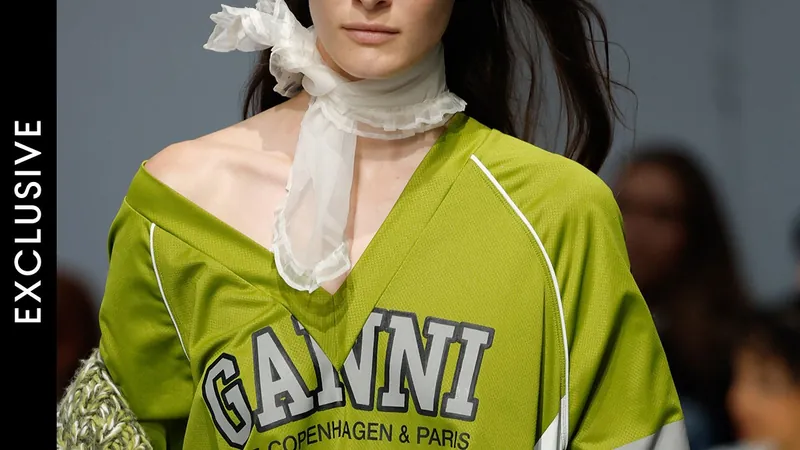
Ganni Partners with Ambercycle to Revolutionize Fashion's Sustainability with Recycled Polyester
2025-01-21
Author: Amelia
Ganni Partners with Ambercycle to Revolutionize Fashion's Sustainability with Recycled Polyester
In an exciting move towards sustainable fashion, the cult Danish brand Ganni has announced a groundbreaking four-year agreement to utilize Cycora, an innovative recycled polyester produced by the Los Angeles-based startup Ambercycle. This agreement stands out as an offtake agreement, which entails Ganni committing to purchase Cycora before it is even produced — a significant step that sustainability advocates are urging more brands to take.
Ganni’s co-founder, Nicolaj Reffstrup, is optimistic about Cycora's potential to “change the game” in textile recycling, an area notoriously challenged by the blending of materials which complicates recycling efforts. Traditional methods often see the quality of recycled textiles degrade over time, with most recycled polyester typically derived from plastic bottles. Cycora, in contrast, is crafted from a mix of post-consumer and post-industrial polyester textile waste, although Ganni has made the commitment to utilize exclusively post-consumer textile waste.
What makes Ambercycle’s approach groundbreaking is its ability to maintain high-quality material through advanced chemical processes that separate polyester molecules effectively. This allows for the extraction of polyester even from fabrics blended with other fibers, ensuring the integrity of the recycled product. In addition to Ganni, Ambercycle has formed partnerships with other major brands, including Inditex, Arc'teryx, Reformation, and Gap Athleta, with Inditex and Arc'teryx also entering into offtake agreements.
The relationship between Ganni and Ambercycle has been in the works since 2021, culminating in the launch of a collection featuring a striking 30% Cycora jersey in 2023, followed by a 70% Cycora offering showcased during Ganni’s Spring/Summer 2025 presentation at Paris Fashion Week. Highlighting its commitment to innovation, the collection included a lime green football jersey crafted from 70% Cycora, aligning with Ganni’s Fabrics of the Future initiative.
“This agreement is critical for us as we believe that next-generation alternatives, like fibre-to-fibre recycling, represent the future of materials in fashion,” Reffstrup states. He emphasizes the importance of proactively securing access to these innovations as demand rises across the globe, ensuring Ganni remains a leader in the adoption of next-gen materials while holding true to its sustainability commitments.
One challenge that many material innovation startups face is the hesitancy of brands to commit upfront to purchasing new materials. This often leaves startups without the necessary funding to scale their operations. While offtake agreements do not eliminate all risks — as evidenced by the bankruptcy of Renewcell, another textile recycling startup after brands failed to uphold their commitments — they do significantly mitigate them.
However, Ganni acknowledges that entering into such agreements is not without its challenges, particularly when forecasting demand in a fashion industry influenced heavily by external variables like consumer behavior and global events. However, Reffstrup maintains that the pursuit of more sustainable alternatives to virgin materials is paramount.
Ganni’s journey towards sustainability also includes offtake agreements with other innovative startups like Modern Synthesis and Polybion, although the Ambercycle partnership stands out in scale and ambition. The brand has committed to reducing its carbon footprint by half between 2021 and 2027 and aims for 10% of its collections to be made from next-gen materials by 2024, alongside pledging to replace 20% of its virgin and bottle-recycled polyester with Cycora.
Ambercycle, in turn, views such agreements as positive indicators to potential investors. Co-founder Shay Sethi explains, “We want to alleviate the risk factors investors encounter when considering a company like Ambercycle. They want assurance that there is a buyer for our products.” He adds that understanding the operational needs of brands like Ganni is crucial for the successful integration of their materials within existing supply chains.
The partnership with Ganni is especially beneficial for Ambercycle, as the Scandinavian brand’s audience is deeply engaged with sustainability narratives. Sethi notes, “Ganni’s storytelling resonates with their community, which is crucial for driving awareness about sustainability challenges and opportunities.” {
This partnership not only marks a significant milestone for Ganni but also represents a hopeful shift towards a more sustainable fashion industry. With more brands stepping up to prioritize the use of recycled materials, the future of fashion could be less about fast trends and more about sustainable practices that benefit both the environment and society.









 Brasil (PT)
Brasil (PT)
 Canada (EN)
Canada (EN)
 Chile (ES)
Chile (ES)
 Česko (CS)
Česko (CS)
 대한민국 (KO)
대한민국 (KO)
 España (ES)
España (ES)
 France (FR)
France (FR)
 Hong Kong (EN)
Hong Kong (EN)
 Italia (IT)
Italia (IT)
 日本 (JA)
日本 (JA)
 Magyarország (HU)
Magyarország (HU)
 Norge (NO)
Norge (NO)
 Polska (PL)
Polska (PL)
 Schweiz (DE)
Schweiz (DE)
 Singapore (EN)
Singapore (EN)
 Sverige (SV)
Sverige (SV)
 Suomi (FI)
Suomi (FI)
 Türkiye (TR)
Türkiye (TR)
 الإمارات العربية المتحدة (AR)
الإمارات العربية المتحدة (AR)